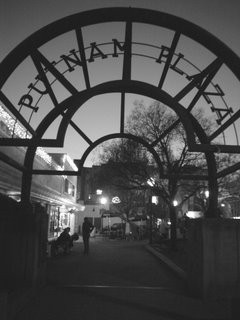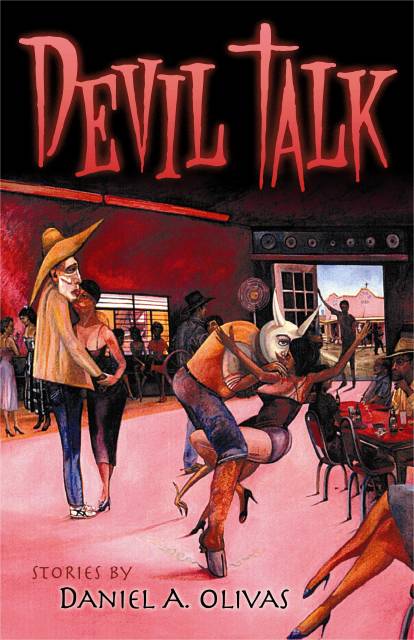Today's Wednedsday Essay comes with a contest challenge, from Anne Mini, the author of the soon-to-be-published memoir, "Is That You, Pumpkin? Love, Loss and the Final Passions of Phillip K. Dick" (Carrol & Graf).
Greetings, Jordan’s readers!
I am the resident blogger for the Pacific Northwest Writers’ Association and Jordan has very kindly allowed me to pass along word about a contest we’re holding up north. All fabulous writers are invited to participate – and, unlike so many writing contests, which discriminate against novelists, we are as open to you submitting pithy scenes as short stories.
I have just given my loyal blog readers a little writing assignment – and a challenge. I threw in a holiday goodie to inspire good writers: the winner of this little contest will not only have his or her writing posted on the PNWA blog, for all to read, but also on a respected literary fiction website.
(And for those of you who are unsure: yes, Virginia, being posted on a third-party website DOES count as publication, technically. You may legitimately use it as a bullet point on your writing resume -- if you are not already making it a practice to maintain a detailed writing resume and adding to it at least once or twice per year, please see my blogs of September 7 and 28; in the long run, it will make your life much easier -- and boast about it in your query letters. Heck, I’ll even write a stellar blurb about the winner, suitable for hitting up my agent now – and an admiring world later, when I am better known -- with “Anne Mini says I write like an angel.” )
As I write this, the turkey is in the oven, the cranberry jelly steeped with cinnamon and cloves is made, and there are apparently sports on television. As we writers know, stolen time sandwiched between obligations is golden writing time, so if you don’t mind my jumping up occasionally to baste, now is the time to write. And today, I am going to ask all of you out there to write about the holiday table, American style.
Before your start groaning at the triteness of the assignment, let me share a tender tale of holiday festivity at Harvard. I remember this particular Thanksgiving distinctly, as it was the year that I unwisely agreed to share the festivity with my roommate’s family. Roomie’s father was a chemistry professor, and he decided that this was the year to determine experimentally just how little heat a turkey could be subjected to and still be served. In my opinion, a microwave oven was not the proper instrument to utilize for this experiment, but who was I to question the march of progress? (The following year, the professor actually won a Nobel Prize, so he must have had good ideas occasionally, but trust me, this was not one of them.) When it came my turn to tell the assembled family what I was grateful for, holding hands around the holiday table, I couldn’t help glancing down at the bloody mess on my plate and blurting: “I’m grateful that I grew up in a family of excellent cooks.”
That year, I was taking an introductory Italian class, taught by a fiery European immigrant who dressed every day in fine black leather suits, claimed to be sleeping with several rather prominent 70-year-old economists then engaged in advising the current president, and moved like a panther in heat. She gave us Italian soft porn comic books to improve our vocabularies – which it certainly did! – and regularly bought out all of a particular shade of red hair dye stocked in Cambridge drug stores, so no one else would have precisely her wild shade. She liked to be noticed.
The class adored her.
Our midterm was set on the last day of class before Thanksgiving break, and for the essay section of the test, we were assigned to write a short piece on our family’s usual celebration. On the first day back from break, our teacher came flying into the room, late as usual. She crushed me to her monumental bosom, redolent of expensive leather, a trifle too much Chanel no. 19, and what I could only assume was the lingering affection of a major economist. With a resounding smack upon my startled head, she announced that I had won a bet for her with the other Italian teaching fellows.
In all of the Italian 101 sections combined, there were perhaps a hundred students, all of whom had been given the same midterm essay assignment. Out of those hundred, I had been the only one who had written a short story. Everyone else had written the Italian equivalent of:
“On Thanksgiving, our family eats turkey. My mother cooks it for a long time. I like gravy on my potatoes. At the end of the meal, we eat pie made from pumpkin, a kind of squash.”
Based upon past experience, my teacher had known that I was constitutionally incapable of writing an essay that straightforward. What won her a bottle of Veuve Cliquot was my little story about how my parents tended to invite every non-citizen they knew to our Thanksgiving repast, so my brother and I would end up vainly trying to explain the more nonsensical traditions to guests totally bewildered by them, much to my parents’ amusement. Then, when everyone was good and perplexed, my father would stand ceremoniously, holding the carving knife and fork aloft – and with a single swift stroke, slice the turkey clean through from top to bottom. Gasps galore. My mother, tireless in pursuit of that one awesome moment when a perfectly-stuffed slice of turkey fell onto the plate, as cohesive as though the whole thing were a ham, would spend hours on end boning the bird. One year, a guest fainted, and had to be revived with a rather potent Napa Valley Chardonnay. The following year, my parents made a suckling pig instead, so large that I was convinced for hours that they had cooked our Labrador retriever and hung a garland of cranberries around its neck.
Why is it that, in writing about the festivals of our lives, we so seldom dwell upon the DISSIMILARITIES between our widely disparate families’ holiday dinner tables? I think even the most creative among us have been cowed into the pretense that we are all the same by those countless scenes in movies that deal with the Thanksgiving meal: always an intact family, with parents permanently married, always the same beautifully-lit pink and beige foods heaped on the table, and almost always in a multi-story A-frame house, located somewhere in New England where the first light snow of winter wafts gently to the ground. There may be drama going on in the other rooms of the house, but in the dining room (there is always a dining room, even when the family depicted is very poor; at worst, there is the world’s largest kitchen equipped with a dining nook that would easily seat 8 adults comfortably), all is harmony and stuffing.
If I knew Thanksgiving only from movies and TV, I would think that every American was struggling to forge an adult relationship with her adorably graying upper middle class WASP parents (he, square-jawed, clean-shaven, and incapable of showing emotion to his nearest and dearest; she, stuck in some sort of arid 1950s oven cleaner ad where everything in the house remains perpetually clean with no effort) and ne’er-do-well brother/slutty sister/frigid sister played by Julianne Moore in an atmosphere of TREMENDOUS FAMILY SECRETS that everyone has known perfectly well for the last decade or two. And yet Mom (unaided, or perhaps with assistance from the non-slutty sister, in the event that such is available; extra points if she is played by Hope Davis and is an asexual corporate lawyer), bless her, always manages to get that perfect meal on the table. No one ever chokes on an underdone drumstick, and spices, beyond nutmeg and perhaps a bit of sage, are utterly unknown.
But for the vast majority of Americans, that is not the way this family festival plays out, is it? For starters, New England, as fond as the Puritans may have been of it, is a rather small part of the country, geographically speaking, and almost none of us are actually descended from the first colonists. Westerners born and bred almost never see a white Thanksgiving (I am quite sure that when we ate suckling pig in California, I was in short sleeves), and Pacific Northwesterners generally go to Grandmother’s house over flat highways marked with grayish drizzle, rather than over the river and through the woods. Unless, of course, it is a period of especially heavy rainfall, in which case we drive our SUVs through flooded streets. Most of our trees are evergreens, so they do not change color at all, and in earthquake country, you don’t see a whole lot of multistory single-family houses, as we don’t like our kith and kin being squashed by falling rubble when the floor starts to shake unmercifully.
And that’s just how different the West Coast experience is on the OUTSIDE.
So here is your challenge, should you care to accept it: write a scene that shows what the holiday table is like in your neck of the woods, and post it via the COMMENTS function at www.pnwa.org/blog (that’s what the copy-and-paste function is for, my friends) before December 15. Use any format you like – a scene, a short story, a semi-epic poem, it’s up to you. Make us laugh, make us cry, but please, don’t make it sound like a TV movie.
Standard format, please (if you don’t know what that is, your submissions to agents and editors are probably being rejected on structural grounds alone: do yourself a favor, and read my blog posting of August 31), and nothing longer than 10 double-spaced pages. Winners will receive undying glory, an actual readership amongst your peers, and posting on a literary fiction website. Just a little resume candy to stuff your holiday stocking.
Ho, ho, ho. Keep up the good work.
Anne Mini












